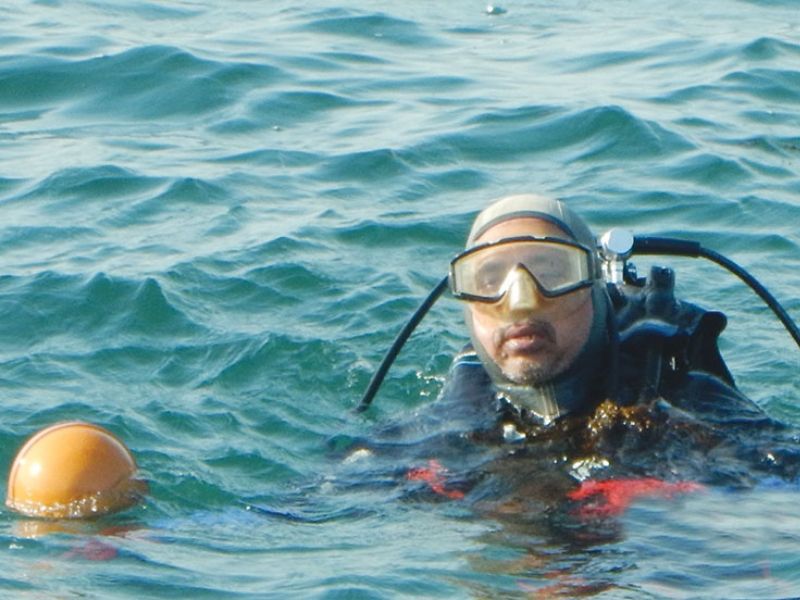As a consequence of global warming and melting polar ice caps, being maritime archaeologists has emerged as a highly specialised vocation – Paromita Sengupta

With rising awareness of the importance of preserving and protecting coastal cities and towns, which could well be overwhelmed by rising sea levels due to the impact of global warming and melting polar ice caps, maritime and sub-sea, aka underwater archaeology has emerged as a highly specialised vocation. Study of the condition of submerged cities of the past can provide clues about ways and means to prevent history from repeating itself.
Consequently oil and gas companies, national governments and conservation groups are increasingly engaging the services of underwater archaeologists to identify, map, inventorise and discover ways and means to protect underwater archaeological sites without adversely affecting commercial shipping, seabed mining, commercial fishing, oil and gas drilling and recreational cruises among other industries.
Although maritime archaeologists employ the field and research and exploration modus operandi of conventional archaeologists, their aquatic work environments require them to acquire professional diving experience and become familiar with scuba diving equipment. Marine archaeologists use magnetic and acoustic remote sensing equipment to locate submerged sites, and acoustic, infrared, and optical equipment to study them. In addition, they conduct research using ship logs, seafarers’ narratives and legal records to write reports, make recommendations about archaeological sites and present research papers in academic journals. Love of the ocean, scuba diving, and affinity for scientific field work, are aptitudes required for success in this emerging 21st century profession.
STUDY PROGRAMMES
Only a handful of universities worldwide offer degree programmes in maritime archaeology. Most practicing maritime archaeologists tend to have conventional Masters and doctorates in anthropology/archaeology and invest in acquiring field experience in related disciplines such as oceanography, history, geology and chemistry.
Graduates with a bachelor’s degree in archaeology/history are eligible to apply for the postgraduate diploma programme in underwater archaeology offered by Pune’s Deccan College of Postgraduate and Research Institute in collaboration with the National Institute of Oceanography, Goa. Among reputed foreign universities offering postgraduate degree programmes in underwater archaeology are the Alexandria (Egypt), Barcelona (Spain), Bournemouth (UK), East Carolina (USA) and Flinders (Australia) universities.
PAY & PERKS
In academia, a research assistant with a postgraduate diploma in underwater archaeology or a Ph D student (junior research fellow) can expect to start at Rs.25,000-30,000 per month, while a post-doctoral fellow is likely to earn Rs.40,000-50,000. On the other hand, conservation and oil and gas companies offer start-up packages of Rs.50,000-100,000 per month. Moreover, underwater archaeologists can also work in education, research and development, and the tourism industry.
“For youth inclined towards a seafaring life, this is an exciting career option which offers the satisfaction of contributing to the preservation of historically rich sub-sea archaeological and shipwreck sites. India has a coastline of over 7,000-km and a 5,000-year-old maritime history — ideal conditions for underwater exploration and research. The current focus of national governments on underwater heritage tourism and writing histories of their countries’ maritime traditions has generated strong demand for underwater archaeologists worldwide,” says Dr. Anirudh Gaur, chief maritime archaeologist at the Marine Archaeology Centre of the CSIR-National Institute of Oceanography, Goa.
To ready and equip himself for his chosen profession, Gaur developed a strong academic foundation with a Masters in ancient Indian history, culture and archaeology awarded by the Jiwaji University, Gwalior followed by a diploma of the Institute of Archaeology, Archaeological Survey of India, New Delhi, which involved two years of intensive field training. Moreover, Gaur also pressed on to work for a Ph D at the Tamil University, Thanjavur. In 1988, he signed up with the National Institute of Oceanography, Goa, where he rose steadily up the academic ladder to the position of chief maritime archaeologist.
“Working as an underwater archaeologist requires long hours of diving in shallow and deep waters and spending substantial time in research laboratories. For people interested in exploring the last unexplored frontiers beneath our oceans, seas and lakes, it’s a fascinating vocation,” says Gaur.























